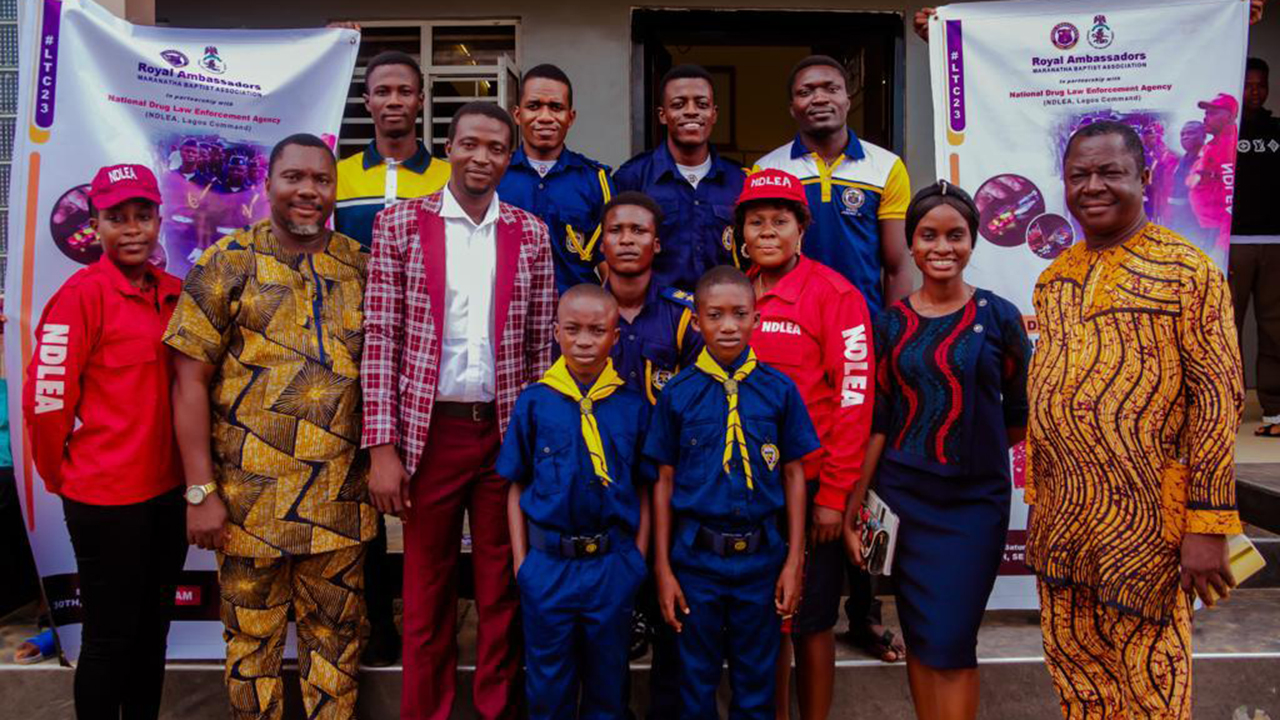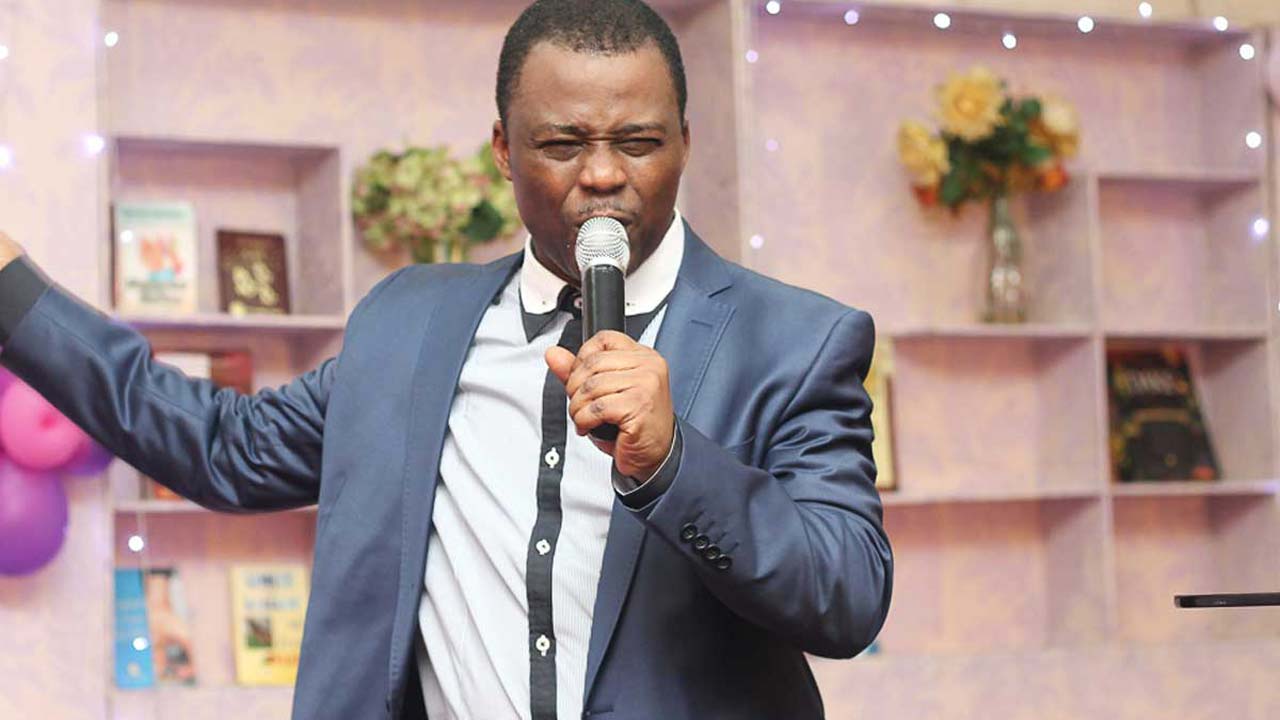
The Royal Ambassadors Maranatha Baptist Association of the New Jerusalem-City Baptist Church (City of God), Ejigbo, last week, organised a youth programme to sensitized the youths of the church and Ejigbo environs about the harmful effects of hard drugs on individual, the church and the society.
Held in the church premises in partnership with the National Drug Law Enforcement Agency (NDLEA, Lagos Command), Rev’d Oluwasegun Paul Kristileke of Peniel Baptist Church disclosed that drugs addiction have negative spiritual effects, which are frequently disregarded, adding that these effects could be physical, psychological, interpersonal and spiritual, separating the individual from God.
Taking his reference from Mark 5:1-9, he noted that there are two types of separation —temporary and eternal separation — adding that in the temporary separation the drug interact with brain and creates false identity of oneself.
“People in this condition isolate themselves from those who can help them and also separate themselves from God and things of God. They may even play adversarial role against Christ and church because of the influence of the drug. Such life, he informed opens doors of affliction to the devil, especially as the individual accepts sinful behaviours as norm. However, this condition can still be redeemed and restoration is possible,” he said.
Explaining the eternal separation, the cleric revealed that it is a situation where the drug makes its user completely insane, adding that some people lose their lives in this process and are forever separated from God and end up in eternal destruction.
Noting that another devastating spiritual consequence is that many addicts lose their sense of purpose in life, Rev’d Kristileke called on the church and every member of the society to rise to the responsibility of helping those involved, saying most times, this group of people come to church, but members isolate them and would not want to relate with them like any other person.
On the way out of the dilemma, Kristileke cited Romans 12:2 and called on the youths to renew their minds with the word of the Lord, saying Satan and his agents are targeting the youths and their minds with the aim of capturing their thinking and to dominate their conducts.
He said the main reason for this, is that a man’s thought creates his/her belief system and the belief system creates ones’ convictions and ones’ conviction creates ones’ attitudes, stressing that attitude controls man’s perception and determine a person’s behaviour.
Harping on the need to continually educate the youth, the cleric cited Hosea 4:6, which says: “My people are destroyed for lack of knowledge….” He noted that ignorant is too costly for any society to bear, therefore we must develop ways of sensitising our youths of the dangers of hard drugs.
“Drug addiction is becoming more complicated and a universal challenge, today, because many parents have abdicated their primary responsibilities of bringing up their children in pursuit of wealth, material things and pleasure. Today, we have about four types of parenting namely — uninvolved, permissive, authoritarian and authoritative parenting. Among the four, uninvolved and permissive are on the increase. Something has to be done. As churches are organising marriage seminars, it is high time we begin to organise parenting seminar.
“The cost of hard drug is too high for any sane society to bear. It has destroyed a lot of great destiny, a lot of lives that supposed to be the solution to the problem of a family, a community, and the nation at large, has been lost to this menace. In addition to personal adversities, the use of hard drug by youths have resulted to family crises and jeopardised many family lives. Social economic cost is also high because no national economy can thrive in an atmosphere of crime because majority of the crime recorded in our nation, today, have been linked to the influence of hard drugs,” the cleric said.
Speaking on “Drug Abuse And Its Effects On Youths,” NDLEA Chief Superintendent of Narcotics, Mrs. Mulikat Adunni Dick, said the National Drug Use Survey conducted by UNODC in 2018 revealed that an estimated 14.3 million Nigerians between the ages of 15 and 64 years had used psychoactive substances other than alcohol and tobacco, adding that about 10.6 million use cannabis, 4.6 million use tramadol, codeine and morphine, while 2.4 million people had used cough syrups containing codeine.
She noted memory lapses, short attention span, difficulty in concentration, slurred or incoherent speech, unhealthy appearance, indifference to hygiene, blood short eye, dilated pupils are all signs of hard drugs abuse.
Classifying hard drugs into stimulants, depressant hallucinogens, Dick stressed that these drugs damage the human central nerves system and other organs, including the brain, heart, liver and lungs.
She revealed that hard drugs are harmful, especially as it impairs users’ judgment and memory, cause hypertension, excessive heartbeat, chronic bleeding and damage to the immune system.
For Dr. Folashade Umokoro from the Lagos State University Teaching Hospital (LASUTH), parents should be mindful of what their children and wards are doing, especially when they start isolating themselves, adding that they should not fail to report any extraordinary behaviours noticed to the psychiatrists for properly investigation.
The mental health expert revealed that hard drug is a dream killer and destiny destroyer and that young people shun it.
“Be mindful of who you follow as a friend. Do no be enticed to take hard drug in any form or be deceived with the lies that it give boldness because, its path leads to destruction, death and lost of ambition,” she said.
Speaking on the roles of media and hard drug, one of the panellists, Omiko Awa of The Guardian Newspaper, said the media frowns on under age drug consumption, adding that the musical videos where under aged and even adults are seen taking hard drugs and other substances are usually shown in paid terrestrial TV stations and cable networks and parents are suppose to prevent their children from watching these channels by using the parental lock, which will prevent their children and wards from tuning in to these offensive areas.
Awa noted that some parents by their actions or inactions introduce their children to drugs when they send these young ones to buy some substances for them and also consume them before the children or by giving these substances to the children in form of herbal concoction (agbo), adding that these concoctions have high dosage of alcohol, which could make some of the children to misbehave while with their peers.
He noted that ‘monkey tail’ sold at the street corners in the name of herbal concoction is another hard drug because it is a blend of marijuana, gin, tramadol and other capsules, stressing some people take it daily in the name of preventing malaria.
The journalist disclosed that under aged are now into drugs because their parents have abdicated their responsibilities to schools and maids, adding that the family, although, the smallest unit of the agent of socialisation remains the first school for any child.
He called on parents to set up family altars, hold daily family prayers and discuss the words of God, saying it is through this means any parent can daily instill the fear of God and build Christian values in their children.
Blaming NDLEA officials for looking the other way each time they see people sell and buy hard drugs in the streets, Pelumi Ojuade (a lawyer) called on other law enforcement agencies including the police to be proactive in arresting and curbing the menace, adding that the law should as well check on music artistes that are seen smoking hemp and other forms of drug in their songs or musical videos, saying these artistes act like role models to these youths through this means.
She called on the youths to make the right choice of whether they want to use drugs or not, adding that ignorance of the law is not an excuse. She informed that any person convicted of hard drug offence is liable to15 years and not exceeding 25 years of imprisonment if found guilty for possessing cocaine or heroine or other hard drugs.
“If truly we want to curb drug abuse, we must weed out the bad officials in NDLEA who are compromising the law and feeding fat on the transactions. There are several alternatives to the criminalisation of drug use such as rehabilitation among others. It is with a view that when drug users, especially minors get rehabilitated they will become better citizens and useful to the society,” she added.





